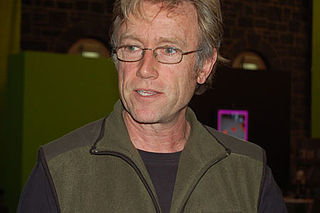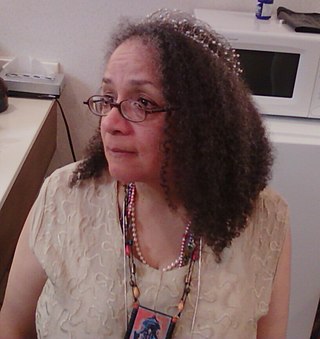Feminist science fiction is a subgenre of science fiction focused on such feminist themes as: gender inequality, sexuality, race, economics, reproduction, and environment. Feminist SF is political because of its tendency to critique the dominant culture. Some of the most notable feminist science fiction works have illustrated these themes using utopias to explore a society in which gender differences or gender power imbalances do not exist, or dystopias to explore worlds in which gender inequalities are intensified, thus asserting a need for feminist work to continue.
Science fiction and fantasy serve as important vehicles for feminist thought, particularly as bridges between theory and practice. No other genres so actively invite representations of the ultimate goals of feminism: worlds free of sexism, worlds in which women's contributions are recognized and valued, worlds that explore the diversity of women's desire and sexuality, and worlds that move beyond gender.

Alice Bradley Sheldon was an American science fiction and fantasy author better known as James Tiptree Jr., a pen name she used from 1967 until her death. It was not publicly known until 1977 that James Tiptree Jr. was a woman. From 1974 to 1985, she also occasionally used the pen name Raccoona Sheldon. Tiptree was inducted into the Science Fiction Hall of Fame in 2012.
The Otherwise Award, originally known as the James Tiptree Jr. Award, is an American annual literary prize for works of science fiction or fantasy that expand or explore one's understanding of gender. It was initiated in February 1991 by science fiction authors Pat Murphy and Karen Joy Fowler, subsequent to a discussion at WisCon.

LGBT themes in speculative fiction include lesbian, gay, bisexual, or transgender (LGBTQ) themes in science fiction, fantasy, horror fiction and related genres.[a] Such elements may include an LGBT character as the protagonist or a major character, or explorations of sexuality or gender that deviate from the heteronormative.

Patrice Ann "Pat" Murphy is an American science writer and author of science fiction and fantasy novels.

Nina Kiriki Hoffman is an American fantasy, science fiction and horror writer.

Suzy McKee Charnas was an American novelist and short story writer, writing primarily in the genres of science fiction and fantasy. She won several awards for her fiction, including the Hugo Award, the Nebula Award and the James Tiptree Jr. Award. A selection of her short fiction was collected in Stagestruck Vampires and Other Phantasms in 2004. The Holdfast Chronicles, a four-volume story written over the course of almost thirty years was considered to be her major accomplishment in writing. The series addressed the topics of feminist dystopia, separatist societies, war, and reintegration. Another of her major works, The Vampire Tapestry, has been adapted into a play called "Vampire Dreams".

Karen Joy Fowler is an American author of science fiction, fantasy, and literary fiction. Her work often centers on the nineteenth century, the lives of women, and social alienation.

Kelley Eskridge is an American writer of fiction, non-fiction and screenplays. Her work is generally regarded as speculative fiction and is associated with the more literary edge of the category, as well as with the category of slipstream fiction.

Paul Collins is an Australian writer and editor who specializes in science fiction and fantasy.

Alison Goodman is an Australian writer of books for young adults.
Cameron Reed is an American science fiction author whose work, while sparse, has met with considerable acclaim.

Nisi Shawl is an African American writer, editor, and journalist. They are best known as an author of science fiction and fantasy short stories who writes and teaches about how fantastic fiction might reflect real-world diversity of gender, sexual orientation, race, physical ability, age, and other sociocultural factors.
Diversicon is an annual speculative fiction convention held in July or August in the Minneapolis-Saint Paul, Minnesota area. Diversicon provides programming and social opportunities to encourage the multicultural, multimedia exploration and celebration of SF by those within and outside of the traditional SF community. Diversicon includes both live and posthumous guests. It is sponsored by SF Minnesota.
Nike Sulway is an Australian novelist.
The role of women in speculative fiction has changed a great deal since the early to mid-20th century. There are several aspects to women's roles, including their participation as authors of speculative fiction and their role in science fiction fandom. Regarding authorship, in 1948, 10–15% of science fiction writers were female. Women's role in speculative fiction has grown since then, and in 1999, women comprised 36% of the Science Fiction and Fantasy Writers of America's professional members. Frankenstein (1818) by Mary Shelley has been called the first science fiction novel, although women wrote utopian novels even before that, with Margaret Cavendish publishing the first in the seventeenth century. Early published fantasy was written by and for any gender. However, speculative fiction, with science fiction in particular, has traditionally been viewed as a male-oriented genre.

Kim Westwood is an Australian author born in Sydney and currently living in Canberra, the Australian Capital Territory.

Nora Keita Jemisin is an American science fiction and fantasy writer. Her fiction includes a wide range of themes, notably cultural conflict and oppression. Her debut novel, The Hundred Thousand Kingdoms, and the subsequent books in her Inheritance Trilogy received critical acclaim. She has won several awards for her work, including the Locus Award. The three books of her Broken Earth series made her the first author to win the Hugo Award for Best Novel in three consecutive years, as well as the first to win for all three novels in a trilogy. She won a fourth Hugo Award, for Best Novelette, in 2020 for Emergency Skin, and a fifth Hugo Award, for Best Graphic Story, in 2022 for Far Sector. Jemisin was a recipient of the MacArthur Fellows Program Genius Grant in 2020.

The following outline is provided as an overview of and topical guide to fantasy:

Ancillary Justice is a science fiction novel by the American writer Ann Leckie, published in 2013. It is Leckie's debut novel and the first in her Imperial Radch space opera trilogy, followed by Ancillary Sword (2014) and Ancillary Mercy (2015). The novel follows Breq—who is both the sole survivor of a starship destroyed by treachery and the vessel of that ship's artificial consciousness—as she seeks revenge against the ruler of her civilization. The cover art is by John Harris.














